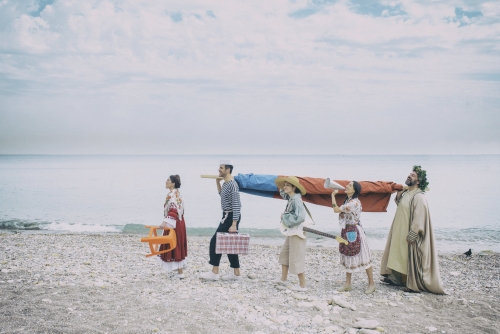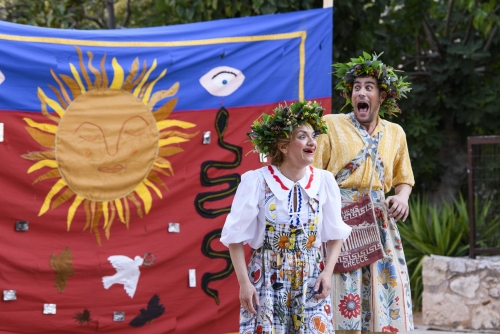The National Theatre of Greece, in close collaboration with the Diazoma Association, with the support of the Ministry of Culture, which has warmly embraced the initiative, and with the help of regional and local governments, is going beyond its narrow geographical boundaries to meet its audience in 16 cultural venues throughout Greece.
With natural light and sound, the last surviving work of Aristophanes, Plutus, which elegantly crowns the poet’s experimentation with the comic genre, will be presented in the following ancient theatres in Greece: Aigeira, Amvrakia, Arcadian Orchomenos, Arta, Gitana, Gythio, Demetrias, Eretria, Zea, Thoricus, Kabireion of Thebes, Cassope, Maroneia, Mieza, Orchomenus in Boeotia, Pleurona and the Ecclesiasterion of Messene.
This represents a felicitous connection of modern culture with the monuments of our cultural heritage and at the same time a valuable synergy between cultural bodies to make theatre and some of its natural spaces central to the life of local communities.
About Plutus
Old Chremylus goes to the oracle of Delphi to ask Apollo if he should raise his son by teaching him the value of injustice, thereby ensuring his future prosperity. The god does not answer directly, but urges him to follow the first person he sees when he leaves the temple. Taking Apollo’s advice, Chremylus finds himself hot on the heels of an old blind man. With the help of his slave, Carion, he discovers that the man is actually Plutus, the god of wealth. Chremylus plans to cure Plutus’s blindness with the help of the god of healing, Asclepius, so that he can fairly distribute his gifts to the virtuous citizens. The goddess of poverty, Penia, who has championed the city until now, tries to stop them, reminding Chremylus – but also the audience – of the need and value of a life lived in moderation. However, Penia will lose the argument hands down.
Asclepius performs his miracle and Plutus regains his sight, and with it his wits. Chremylus’s house is packed with visitors to his guest. The new situation has not only changed the balance of society but has also brought disruption to Mount Olympus. Hermes, the messenger of the gods, has no work, and asks for help from Plutus, while the priest at the temple of Zeus is starving because the Athenians have stopped making sacrifices to the god. Finally, good sense prevails and Plutus, accompanied by the Chorus, is led back to his old home, at the back of the temple of Athena in the Parthenon, where the city’s coffers are kept.
Plutus (338 BC), the last of Aristophanes’ surviving comedies, abandons the structure and motifs of Old Comedy, marking a shift to New Comedy. Aristophanes removes the choric interludes, the parabasis and the sting of derisive jokes from his play, turning his attention to the problems of everyday life.
Director’s note
The blind god, Plutus, regains his sight and shares the wealth equally in society. An early socialist or just nostalgic for a lost golden age? The play, written in 388 BC, after the defeat of Athens in the Peloponnesian War, suggests another Aristophanian utopia. But is a society whose material needs are fully met a happy one? Does individual prosperity precede social well-being? When is one truly free? When do the bonds of happiness break?
In this late-period play, the presence of the Chorus is negligible; it is a simple observer of developments. A Chorus that is absent is symbolic of a city that is indifferent. A small company of actors travels around Greece, inviting audiences to a new gathering in places where society once went for entertainment, debated, and made decisions. It invites us to listen together, to laugh together, and ultimately to return to being together, abandoning technological (or any other kind of) loneliness
Manos Vavadakis
Information
Summer Tour
- 18/07/2024 19:30Ancient Theater of kabeirion of Thebes
- 19/07/2024 20:00Theater of Demetrias, Volos
- 21/07/2024 19:30Ancient Theater of Maroneia, Rhodope
- 24/07/2024 19:30Ancient Theater of Mieza, Naoussa
- 26/07/2024 19:30Theater of ancient Gitana, Philiates, Thesprotia
- 27/07/2024 19:30Theater of Cassope, Preveza
- 28/07/2024 19:30.Ancient Theatre of Amvrakia
- 30/07/2024 19:30Theater of Nea Pleurona, Messolonghi
- 31/07/2024 19:30Ancient Theater of Aigeira, Aigio
- 01/08/2024 19:30Ecclesiasterion of Messene
- 02/08/2024 19:30Ancient Theater of Gythio
- 03/08/2024 19:30The ancient theater of Arcadian Orchomenos, Tripoli
- 30/08/2024 19:00Theatre of Eretria
- 31/08/2024 19:00Theatre of Eretria
- 05/09/2024 18:30The theatre of Orchomenus in Boetia
- 11/09/2024 18:30Ancient Theater of Zea
- 13/09/2024 18:30Ancient Theater of Thoricus, Laurion
Entry to all venues is free with tickets that will be distributed one hour before the performances begin. Entry to the Ancient Theatre of Amvrakia is free.
At the Ancient Theatre of Gitana( Filiates, Thesprotia), Ancient Theatre of Cassope (Preveza), Ancient Theatre of Pleurona (Messolonghi), Ecclesiasterion of Messene, Ancient Theatre of Orchomenus in Boeotia and Ancient Theatre of Zea (Piraeus) the price of entry to the archaeological site will be paid
Duration: 60'
Many thanks to the Municipalities of Thebes, Maroneia-Sapon, Naoussa, Filiaton, Preveza, Arta, Messolonghi, Aigialeia, Tripoli, Messina, Gythio, Orchomenus in Boeotia, Lavreotiki, Eretria, Arta, Piraeus and to the Region of Thessaly.
creation team
-
Dimosthenis Papamarkos
Translation and adaptation -
Manos Vavadakis
Direction and adaptation -
Gina Iliopoulou
Set and costumes -
Lina Stavropoulou
Set and costumes -
Dimitris Tasenas
Original music -
Myrto Grapsa
Movement -
Melina Peonidou
Music coach -
Vivi Spathoula
Dramaturg -
Aris Laskos
Directing assistant -
Design assistant
-
Marianthi Xintarianou-Tsiropina
Second directing assistant

























